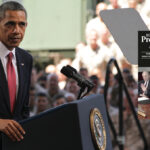
One of the interesting things is there’s no agreement domestically among civilians and military or internationally about what strategy is.
Each year, while the military senior service schools compete upon the fields of friendly strife in the event known as Jim Thorpe Sports Days, the U.S. Army War College hosts a different kind of contest: The Annual Army War College Strategy Competition. This contest pits teams from various U.S. military education institutions, international war colleges, and civilian universities against each other to see who can develop the best strategies to solve complex real-world national security problems.
Celestino Perez, the creator of the competition, joins host JP Clark to discuss this year’s event, which included teams from 7 U.S. professional military education schools, the Australian War College, the French Ecole de Guerre, West Point, and five civilian universities.
Perez highlights that the competition is less about winning and more about the learning process. It’s a chance for students to learn from each other, from faculty, and from a diverse group of judges, including top military and academic minds.
Podcast: Download
Celestino Perez is an Associate Professor at the U.S. Army War College. He serves as the Chair of Executive and Strategic Leadership and as the Director of the Carlisle Scholars Program. Tino teaches policy, strategy, civil and interstate wars, and military ethics. Trained as a political theorist, he has published in Armed Forces and Society, Peace Review, Journal of Military Ethics, and Perspectives on Politics, as well as professional pieces in Joint Force Quarterly, Military Review, Strategy Bridge, and War on the Rocks.
JP Clark is an associate professor of military strategy teaching in the Basic Strategic Art Program. He served in the army for twenty-six years as an armor officer and strategist. He holds a Ph.D. and M.A. in history from Duke University, an M.S.S. from the Army War College, and a B.S. in Russian and German from West Point. He is the author of Preparing for War: The Emergence of the Modern U.S. Army, 1815-1917 (Harvard, 2017). He is currently working on a history of U.S. military strategy in the Pacific from 1898 to 1941 that is under contract with the University Press of Kansas. He is the 3rd Editor-in-Chief of War Room.
The views expressed in this presentation are those of the speakers and do not necessarily reflect those of the U.S. Army War College, U.S. Army, or Department of Defense.
Photo Credit: Generated by Gemini





Beginning at about the 30:00 point in this podcast, and as to the idea of feasibility, Dr. Perez speaking here:
” … Strategies must be formed within an environment that is well-understood, and that environment includes constraints … ”
Question:
Re: the the 2025 Annual Army War College Strategy Competition and this competition’s requirement of having participants develop and present whole-of-government and military strategies — to address the real-world challenge of deterring large-scale combat with the People’s Republic of China — re: this such competition and requirement, it would be interesting to know what the winning team presented as to what they considered to be the well-understood environment, and the constraints relating thereto.
Is it possible that we can have access to this?
Related to my “well-understood environment, etc.,” question above:
a. If “war (and, thus, large-scale combat operations in the service of same?) is a continuation of politics by other means” and, thus, is a tool that can be used to achieve political goals.
b. Then, from that such perspective, what do we believe to be the political goals of China, which we believe that China is likely to use such things as war — and large-scale combat operations (etc.) — to achieve/to help achieve?
(From this such perspective, thus, and re: our “whole-of-government and military strategies,” we are not just seeking to “deter large-scale combat with the People’s Republic of China,” but, rather, are seeking to deter China from achieving/seeking to achieve it’s political objectives — via “war” and/or via other means?)
Also as relates to a “well-understood environment, etc.,” might we wish to consider such things as the general move by the U.S., of late, to (a) embrace the idea of a multipolar/multicivilizational world and to (b) embrace such things as illiberalism?
From this such “we are pretty much doing what you want us to do” perspective (embrace the idea of a multipolar/multicivilizational world; embrace such things as illiberalism), China — and indeed many if not all our opponents/competitors/enemies — having much less need, today, to use such things as war, and/or to use such things as large-scale combat operations (etc., etc., etc.); these, to achieve their (now already significantly achieved?) political objectives?
Re: strategy, and the need to have a well-understood environment so as to be able to reasonably articulate and establish same (see my initial comments above); as to these such matters, consider the following description of the well-understood environment of the Cold War:
“The United States and the Soviet Union face each other not only as two great powers which in the traditional ways compete for advantage. They also face each other as the fountain heads of two hostile and incompatible ideologies, systems of government and ways of life, each trying to expand the reach of its respective political values and institutions and to prevent the expansion of the other. Thus the cold war has not only been a conflict between two world powers but also a contest between two secular religions. And, like the religious wars of the seventeenth century, the war between communism and democracy does not respect national boundaries. It finds enemies and allies in all countries, opposing the one and supporting the other regardless of the niceties of international law. Here is the dynamic force which has led the two superpowers to intervene all over the global, sometimes surreptitiously, sometimes openly, sometimes with the accepted methods of domestic pressure and propaganda, sometimes with the frowned-upon instruments of covert subversion and open force.” (See Hans Morgenthau’s — 1967 — “To Intervene or Not to Intervene.”)
As to this such well-understood Cold War environment, is this not totally gone today; this, with neither Russia, China — or even the U.S. today — “facing each other as the fountain heads of hostile and incompatible ideologies, systems of government and ways of life, each trying to expand the reach of its respective political values and institutions and trying to prevent the expansion of the other. … ” ? (As to that such suggestion, see my third comment — immediately above.)
If this indeed is the case, then should we not consider the well-understood environment of today; this, as being one in which “great powers, in the traditional ways only, compete for advantage?” (See the first sentence of the Hans Morgenthau item provided immediately above.)
Question — Based on the above:
What, then, are the “traditional ways that great powers compete for advantage,” to wit: the well-understood environment that — in the more-distant past — and again today — nations needed/need to craft their strategies for?
In my comment immediately above, I suggest that, today, the “well-understood environment,” in which nations must formulate their strategies currently, this IS NOT one in which (as it was during the Cold War) the great powers “face each other as the fountain heads of hostile and incompatible ideologies, systems of government and ways of life, each trying to expand the reach of its respective political values and institutions and trying to prevent the expansion of the other.”
Rather I suggest, in my comment immediately above, that the “well-understood environment” of today, in which we must currently must formulate our strategy, this is one in which the U.S. has moved to embrace (or at least to call out as legitimate as our own) the very different ideologies, the very different systems of government and the very different ways of life of our opponents/our competitors/our enemies. In this regard, consider the following:
“We are also realistic and understand that the American way of life cannot be imposed upon others, nor is it the inevitable culmination of progress.” (See Page 4 of the Trump National Security Strategy — midway down the second column.)
“We do not expect diverse countries to share the same cultures, traditions, or even systems of government. But we do expect all nations to uphold these two core sovereign duties: to respect the interests of their own people and the rights of every other sovereign nation. This is the beautiful vision of this institution, and this is foundation for cooperation and success.” (See about the 15th paragraph of the White House transcript of the Trump 2017 speech to the United Nations General Assembly.)
“Strong, sovereign nations let diverse countries with different values, different cultures, and different dreams not just coexist, but work side by side on the basis of mutual respect.” (See about the 16th paragraph of the White House transcript of the Trump 2017 speech to the United Nations General Assembly.)
As to my such “we embrace”/”we accept as legitimate” contention, consider the (very different/the disagreeing?) reasoning/rationale suggested by John M. Owen, IV; this, in his article in the MIT Press journal “International Security” (Volume 49, Issue 3, Winter 2025) entitled “Why Great Powers Compete to Control International Institutions.” Here is the abstract of same:
“The world’s two great powers, China and the United States, are competing over international order—that is, the rules, norms, and institutions that regulate relations among states and societies. China’s ruling party is discontented with several features of the liberal international order that the United States and its allies constructed after World War II. Sino-American struggles over the content of institutions suggest that great powers compete to control international institutions. Such competition is especially intense when great powers have different domestic regimes, such as democracy and autocracy. Power and security are at stake because different types of international orders can grant material and social advantages to different types of states. My ecological theory of competition over international institutions makes three claims: (1) international institutions select for one regime type over alternatives; (2) the typical government believes that it is in its core interest to preserve its regime type; and (3) great powers can shape international institutions to select for their own regime type. I demonstrate these dynamics in great power relations in the interwar period (1919–1939).”
Question — Based on the above:
If we indeed are not competing, but indeed are agreeing, as to the need for a new international order — and the need for a new basis for same (see my three quoted items above) — then does THIS not become (a) “the well-understood environment,” within which, (b) we must develop our strategy(ies)?